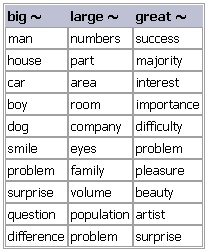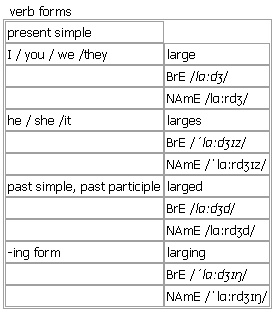 large
large

large [large larger largest] adjective, verb BrE [lɑːdʒ] NAmE [lɑːrdʒ]
adjective (larger, larg·est)
1. big in size or quantity
•a large area/family/house/car/appetite
•a large number of people
•very large sums of money
• He's a very large child for his age.
• A large proportion of old people live alone.
•Women usually do the larger share of the housework.
•Brazil is the world's largest producer of coffee.
•Who's the rather large (= fat) lady in the hat?
2. (abbr.L)used to describe one size in a range of sizes of clothes, food, products used in the house, etc.
•small, medium, large
3. wide in range and involving many things
•a large and complex issue
• Some drugs are being used on a much larger scale than previously.
• If we look at the larger picture of the situation, the differences seem slight.
more at loom large at ↑loom v., writ large at ↑writ v.
Word Origin:
Middle English (in the sense ‘liberal in giving, lavish, ample in quantity’): via Old French from Latin larga, feminine of largus ‘copious’.
Thesaurus:
large adj.
•A thousand pounds seemed like a large sum of money.
big • • great • • spacious • • extensive • • huge • • massive • • vast • • enormous • • substantial • • considerable • • sizeable • • hefty •
Opp: small, Opp: little
a/an large/big/great/extensive/spacious/huge/massive/vast/enormous/substantial/considerable/sizeable area
a/an large/big/spacious/huge/massive/vast/enormous building
a/an large/big/great/extensive/substantial/considerable/sizeable/handsome amount
a/an large/big/great/huge/massive/vast/enormous/substantial/considerable/sizeable/hefty increase
Large, big or great? Compare
•(a) large numbers/part/volume/population
• a big man/house/car/boy/dog/smile
• great interest/importance/difficulty/pleasure
Large is slightly more formal than big and is used more in writing. It is not usually used to describe people, except to avoid saying ‘fat’. Great often suggests quality and not just size; it does not usually describe the physical size of objects or people.
Language Bank:
generally
Ways of saying ‘in general’
▪ Women generally ▪ earn less than men.
Generally speaking ▪, jobs traditionally done by women are paid at a lower rate than those traditionally done by men.
In general ▪ / By and large ▪, women do not earn as much as men.
▪ Certain jobs, like nursing and cleaning, are still mainly ▪ carried out by women.
▪ Senior management posts are predominantly ▪ held by men.
▪ Most senior management posts tend to ▪ be held by men.
▪ Women are, for the most part ▪, still paid less than men.
▪ Economic and social factors are, to a large extent ▪, responsible for women being concentrated in low-paid jobs.
Language Banks at ↑conclusion, ↑except, ↑similarly
Synonyms:
big / large / great
These adjectives are frequently used with the following nouns:
Large is more formal than big and should be used in writing unless it is in an informal style. It is not usually used to describe people, except to avoid saying ‘fat’.
Great often suggests quality and not just size. Note also the phrases: ▪ a large amount of ◇ ▪ a large number of ◇ ▪ a large quantity of ◇ ▪ a great deal of ◇ ▪ in great detail ◇ ▪ a person of great age.
Example Bank:
•By this time his debt had become extremely large.
•His eyes were abnormally large.
•Isn't that jumper rather large?
•Our house was not overly large.
•Some of the clothes looked very large.
•The issue looms large in political campaigns nationwide.
•The plant had grown quite large.
•The universe is infinitely large.
•a huge chair behind an equally large desk
•the increasingly large numbers of senior citizens
•Brazil is the world's largest producer of coffee.
•I grew up in a large family.
•It's better value if you buy a large box.
•There were some very large sums of money involved.
•Who is the rather large lady in the hat?
•Would you like small, medium or large?
Idioms: ↑at large ▪ ↑by and large ▪ ↑give it large ▪ ↑in large measure ▪ ↑in large part ▪ ↑large as life ▪ ↑large it ▪ ↑large it up ▪ ↑larger than life
Derived Word: ↑largeness
verb
Verb forms: 
Word Origin:
Middle English (in the sense ‘liberal in giving, lavish, ample in quantity’): via Old French from Latin larga, feminine of largus ‘copious’.
|
|
